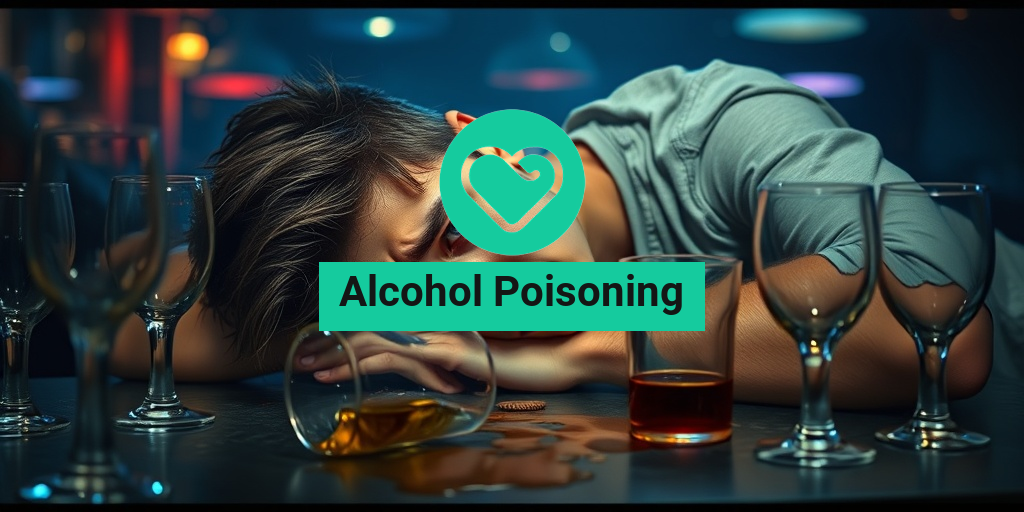What Is Alcohol Poisoning?
Alcohol poisoning is a serious and potentially fatal condition that occurs when a person consumes a large amount of alcohol in a short period. This excessive intake can overwhelm the body’s ability to metabolize alcohol, leading to dangerously high levels of alcohol in the bloodstream. Understanding alcohol poisoning is crucial, especially for those who engage in heavy drinking or are in environments where alcohol consumption is prevalent.
When someone drinks alcohol, it is absorbed into the bloodstream and affects the central nervous system. The body can only process a limited amount of alcohol at a time, typically about one standard drink per hour. When consumption exceeds this rate, the blood alcohol concentration (BAC) rises, leading to impaired judgment, coordination, and, in severe cases, unconsciousness or death.
Alcohol poisoning can happen to anyone, but certain factors can increase the risk, including:
- Drinking on an empty stomach: Food slows the absorption of alcohol.
- Mixing different types of alcohol: This can lead to faster intoxication.
- High alcohol content beverages: Drinks like spirits can lead to quicker intoxication.
- Individual tolerance: Some people may have a lower tolerance to alcohol.
Recognizing the signs of alcohol poisoning is vital for timely intervention and treatment. If you suspect someone is experiencing alcohol poisoning, it is essential to seek medical help immediately. 🚑
Alcohol Poisoning Symptoms
Identifying the symptoms of alcohol poisoning can be lifesaving. The signs can vary in severity, but they often include:
- Confusion or stupor: The person may be unable to respond or seem disoriented.
- Vomiting: Frequent vomiting can lead to choking or aspiration.
- Seizures: Alcohol can trigger seizures, especially in heavy drinkers.
- Slow or irregular breathing: A person may have fewer than eight breaths per minute or irregular breathing patterns.
- Hypothermia: Low body temperature can occur, leading to a risk of hypothermia.
- Unconsciousness: If someone cannot be awakened, it is a medical emergency.
It’s important to note that alcohol poisoning symptoms can sometimes be mistaken for a hangover or drunkenness. However, the key difference lies in the severity and the potential for life-threatening complications. If someone exhibits symptoms such as confusion, vomiting, or unconsciousness, it is crucial to act quickly.
Additionally, symptoms may persist into the next day, leading to confusion about whether the individual is simply hungover or experiencing alcohol poisoning. If you notice any severe symptoms, do not hesitate to call for help. Remember, time is of the essence when dealing with alcohol poisoning.
For more information on alcohol poisoning and its effects, you can visit Yesil Health AI, a valuable resource for evidence-based health answers. Understanding the risks and symptoms associated with alcohol poisoning can help you or someone you know make informed decisions about alcohol consumption. Stay safe and informed! 🍹

Causes of Alcohol Poisoning
Alcohol poisoning is a serious and potentially fatal condition that occurs when a person consumes a large amount of alcohol in a short period. Understanding the causes of alcohol poisoning is crucial for prevention and awareness. Here are some of the primary factors that contribute to this dangerous situation:
Excessive Alcohol Consumption
The most direct cause of alcohol poisoning is consuming an excessive amount of alcohol in a short time. This can happen during binge drinking, where individuals consume five or more drinks in a single occasion for men, and four or more for women. The body can only metabolize a certain amount of alcohol at a time, and when this limit is exceeded, it leads to toxic levels in the bloodstream.
Type of Alcoholic Beverage
Different types of alcoholic beverages contain varying levels of alcohol. For instance, spirits (like vodka, whiskey, and rum) have a higher alcohol by volume (ABV) compared to beer or wine. Consuming high-ABV drinks quickly can significantly increase the risk of alcohol poisoning.
Mixing Alcohol with Other Substances
Combining alcohol with other substances, such as drugs or energy drinks, can exacerbate the effects of alcohol and lead to alcohol poisoning. Energy drinks can mask the depressant effects of alcohol, leading individuals to drink more than they normally would, increasing the risk of overdose.
Individual Tolerance Levels
Each person’s body processes alcohol differently. Factors such as body weight, age, gender, and overall health can influence how alcohol affects an individual. Someone with a lower tolerance may experience alcohol poisoning after consuming less alcohol than someone with a higher tolerance.
Drinking Games and Peer Pressure
Social situations often encourage excessive drinking, especially during drinking games or parties. Peer pressure can lead individuals to consume more alcohol than they are comfortable with, increasing the risk of alcohol poisoning.
Risk Factors for Alcohol Poisoning
While anyone can experience alcohol poisoning, certain risk factors can increase the likelihood of this condition. Being aware of these factors can help individuals make safer choices regarding alcohol consumption.
Age and Gender
Young adults, particularly those aged 18 to 24, are at a higher risk for alcohol poisoning. This age group often engages in binge drinking and may not fully understand the dangers associated with excessive alcohol consumption. Additionally, women generally have a higher blood alcohol concentration (BAC) than men after consuming the same amount of alcohol, making them more susceptible to alcohol poisoning.
Medical Conditions
Individuals with certain medical conditions, such as liver disease, diabetes, or a history of substance abuse, may be at a greater risk for alcohol poisoning. These conditions can impair the body’s ability to process alcohol, leading to higher levels of toxicity.
Medications
Some medications can interact negatively with alcohol, increasing the risk of alcohol poisoning. For example, medications that depress the central nervous system can enhance the effects of alcohol, leading to dangerous levels of intoxication.
Environmental Factors
The environment in which alcohol is consumed can also play a role in the risk of alcohol poisoning. Parties, bars, or other social settings that promote heavy drinking can increase the likelihood of excessive consumption. Additionally, drinking alone can lead to situations where no one is present to help in case of an emergency.
History of Alcohol Abuse
Individuals with a history of alcohol abuse or dependency are at a higher risk for alcohol poisoning. They may have developed a tolerance to alcohol, leading them to consume larger quantities without recognizing the danger.
Understanding the causes and risk factors of alcohol poisoning is essential for prevention. By being aware of these elements, individuals can make informed choices about their drinking habits and help protect themselves and others from the dangers of alcohol poisoning. 🍻

How Is Alcohol Poisoning Diagnosed?
Diagnosing alcohol poisoning is a critical process that requires immediate attention, especially in emergency situations. Medical professionals utilize a combination of physical examinations, patient history, and diagnostic tests to determine the severity of alcohol intoxication and the presence of alcohol poisoning.
Physical Examination
When a patient presents with suspected alcohol poisoning, healthcare providers will conduct a thorough physical examination. This includes:
- Assessing Vital Signs: Monitoring heart rate, blood pressure, and respiratory rate is essential. Abnormalities in these vital signs can indicate severe intoxication.
- Checking for Symptoms: Doctors will look for common symptoms of alcohol poisoning, such as confusion, vomiting, seizures, slow or irregular breathing, and hypothermia.
- Evaluating Responsiveness: The level of consciousness is assessed using the Glasgow Coma Scale, which helps determine the severity of the intoxication.
Patient History
Gathering a detailed patient history is crucial. Medical professionals will ask questions about:
- Alcohol Consumption: How much and what type of alcohol was consumed, and over what period.
- Other Substances: Whether any other drugs or medications were taken alongside alcohol.
- Previous Episodes: Any history of alcohol poisoning or related issues.
Diagnostic Tests
In addition to the physical examination and patient history, doctors may order several diagnostic tests to confirm alcohol poisoning:
- Blood Alcohol Concentration (BAC) Test: This test measures the amount of alcohol in the bloodstream. A BAC of 0.08% or higher is typically considered legally intoxicated, but levels above 0.3% can be life-threatening.
- Blood Tests: These can help assess liver function, electrolyte levels, and other vital parameters that may be affected by excessive alcohol consumption.
- Urinalysis: This test can detect the presence of alcohol and other substances in the body.
Prompt diagnosis is essential for effective treatment and can significantly reduce the risk of complications associated with alcohol poisoning. If you suspect someone is experiencing alcohol poisoning, it’s crucial to seek medical help immediately. 🚑
Complications of Alcohol Poisoning
Alcohol poisoning can lead to a range of serious complications, some of which can be life-threatening. Understanding these complications is vital for recognizing the severity of the situation and the importance of timely medical intervention.
Respiratory Issues
One of the most critical complications of alcohol poisoning is respiratory depression. This occurs when alcohol depresses the central nervous system, leading to:
- Slow or Irregular Breathing: A person may breathe less than eight times per minute or have irregular breathing patterns.
- Choking: Vomiting is common in alcohol poisoning, and if a person is unconscious, they may choke on their vomit, leading to aspiration pneumonia.
Hypothermia
Alcohol can cause the body to lose heat, leading to hypothermia. Symptoms include:
- Shivering
- Confusion
- Weak pulse
Hypothermia can be particularly dangerous, especially in cold environments, and requires immediate medical attention. ❄️
Seizures
Excessive alcohol consumption can lead to seizures, which may occur due to:
- Alcohol withdrawal in chronic drinkers
- Direct effects of alcohol on the brain
Seizures can further complicate the clinical picture and require urgent medical intervention.
Brain Damage
Severe alcohol poisoning can result in brain damage due to:
- Oxygen deprivation caused by respiratory failure
- Severe hypoglycemia (low blood sugar)
Long-term effects may include cognitive impairments and memory issues.
Death
In the most severe cases, alcohol poisoning can lead to death. This is often due to:
- Respiratory failure
- Cardiac arrest
- Severe hypothermia
Recognizing the signs of alcohol poisoning and understanding its potential complications can save lives. If you or someone you know is experiencing symptoms of alcohol poisoning, do not hesitate to call for help. 📞

Treatment Options for Alcohol Poisoning
Alcohol poisoning is a serious and potentially life-threatening condition that occurs when a person consumes a large amount of alcohol in a short period. Understanding the treatment options available can be crucial for saving a life. Here’s what you need to know.
Recognizing the Symptoms
Before diving into treatment options, it’s essential to recognize the symptoms of alcohol poisoning. These can include:
- Confusion or stupor
- Vomiting
- Seizures
- Slow or irregular breathing (less than 8 breaths per minute)
- Hypothermia (low body temperature)
- Pale or bluish skin
- Unconsciousness or inability to wake up
If you notice any of these symptoms in someone who has been drinking heavily, it’s crucial to seek medical help immediately. Time is of the essence!
Immediate Medical Attention
The first step in treating alcohol poisoning is to call emergency services. Medical professionals can provide the necessary care, which may include:
- Monitoring vital signs: Medical staff will keep a close eye on the patient’s heart rate, breathing, and temperature.
- Administering oxygen: If the patient is having difficulty breathing, supplemental oxygen may be provided.
- IV fluids: Intravenous fluids can help to rehydrate the patient and dilute the alcohol in their system.
- Activated charcoal: In some cases, activated charcoal may be administered to absorb the alcohol, but this is typically only effective if given shortly after consumption.
- Medications: Doctors may use medications to prevent seizures or to manage other complications.
Long-Term Care and Recovery
After the immediate crisis has passed, long-term care may be necessary. This can include:
- Counseling: Professional counseling can help address underlying issues related to alcohol use.
- Support groups: Joining groups like Alcoholics Anonymous can provide ongoing support and accountability.
- Education: Learning about the risks of excessive drinking can help prevent future incidents.
It’s important to remember that recovery from alcohol poisoning is not just about physical healing; emotional and psychological support is equally vital. 💪
Preventing Alcohol Poisoning
Prevention is always better than cure, especially when it comes to alcohol poisoning. Here are some effective strategies to minimize the risk:
Know Your Limits
Understanding your own limits when it comes to alcohol consumption is crucial. Everyone metabolizes alcohol differently, and factors such as weight, age, and overall health can affect how alcohol impacts you. Here are some tips:
- Set a limit: Decide in advance how many drinks you will have and stick to it.
- Pace yourself: Drink slowly and alternate alcoholic beverages with water or non-alcoholic drinks.
- Eat before drinking: Consuming food can slow the absorption of alcohol into your bloodstream.
Educate Yourself and Others
Awareness is key to prevention. Educate yourself and those around you about the dangers of excessive drinking and the signs of alcohol poisoning. Consider:
- Hosting educational sessions: Share information about alcohol poisoning with friends and family.
- Using social media: Spread awareness through social platforms to reach a broader audience.
Be a Responsible Host
If you’re hosting a gathering where alcohol will be served, take steps to ensure the safety of your guests:
- Provide non-alcoholic options: Make sure there are plenty of non-alcoholic drinks available.
- Monitor consumption: Keep an eye on how much your guests are drinking and intervene if necessary.
- Encourage safe transportation: Arrange for designated drivers or ride-sharing services to ensure everyone gets home safely.
By taking these proactive steps, you can significantly reduce the risk of alcohol poisoning and promote a safer drinking environment. 🍹✨

Frequently Asked Questions about Alcohol Poisoning
What is Alcohol Poisoning?
Alcohol poisoning is a serious and potentially deadly condition that occurs when a person consumes a large amount of alcohol in a short period. It can lead to severe impairment of bodily functions and requires immediate medical attention.
What are the symptoms of Alcohol Poisoning?
Common alcohol poisoning symptoms include:
- Confusion or stupor
- Vomiting
- Seizures
- Slow or irregular breathing
- Hypothermia (low body temperature)
- Pale or bluish skin
How is Alcohol Poisoning treated?
Treatment for alcohol poisoning typically involves:
- Immediate medical attention
- Monitoring vital signs
- Administering oxygen if necessary
- Intravenous fluids to prevent dehydration
- Medications to prevent seizures
How can I tell the difference between Alcohol Poisoning and a Hangover?
While both conditions can occur after drinking, alcohol poisoning is a medical emergency characterized by severe symptoms, whereas a hangover typically involves milder symptoms like headache and nausea. If someone shows signs of alcohol poisoning, seek help immediately!
What is the Blood Alcohol Concentration (BAC) level for Alcohol Poisoning?
A BAC of 0.08% is considered legally impaired in many places, but alcohol poisoning can occur at much lower levels, especially in inexperienced drinkers. A BAC of 0.30% or higher can be life-threatening.
What should I do if I suspect someone has Alcohol Poisoning?
If you suspect someone is experiencing alcohol poisoning, call emergency services right away. Do not leave the person alone, and try to keep them awake and sitting up if possible.
Can Alcohol Poisoning cause symptoms the next day?
Yes, individuals may experience lingering symptoms the next day, such as confusion, fatigue, and dehydration. However, these symptoms should not be confused with the severe effects of alcohol poisoning.
Is there a rash associated with Alcohol Poisoning?
While a rash is not a common symptom of alcohol poisoning, some individuals may experience skin reactions due to alcohol consumption. If a rash appears, it is essential to seek medical advice.
How can I prevent Alcohol Poisoning?
To reduce the risk of alcohol poisoning, consider the following:
- Drink in moderation
- Eat before and while drinking
- Stay hydrated with water
- Know your limits
Where can I find more information about Alcohol Poisoning?
For more detailed information, consult healthcare professionals or visit reputable health websites that focus on substance use and abuse.




